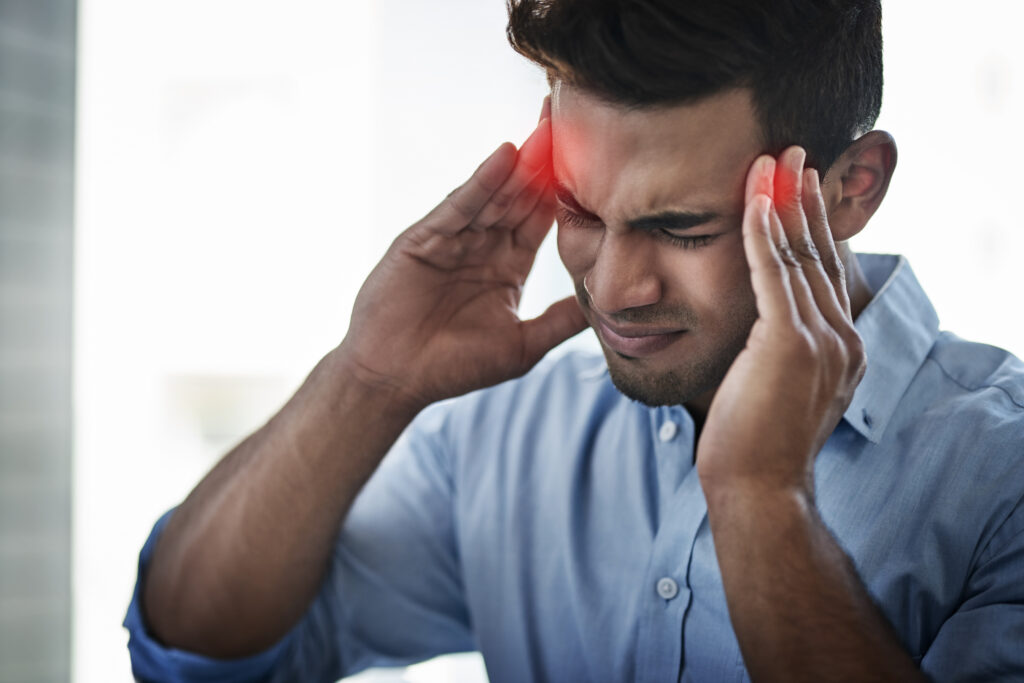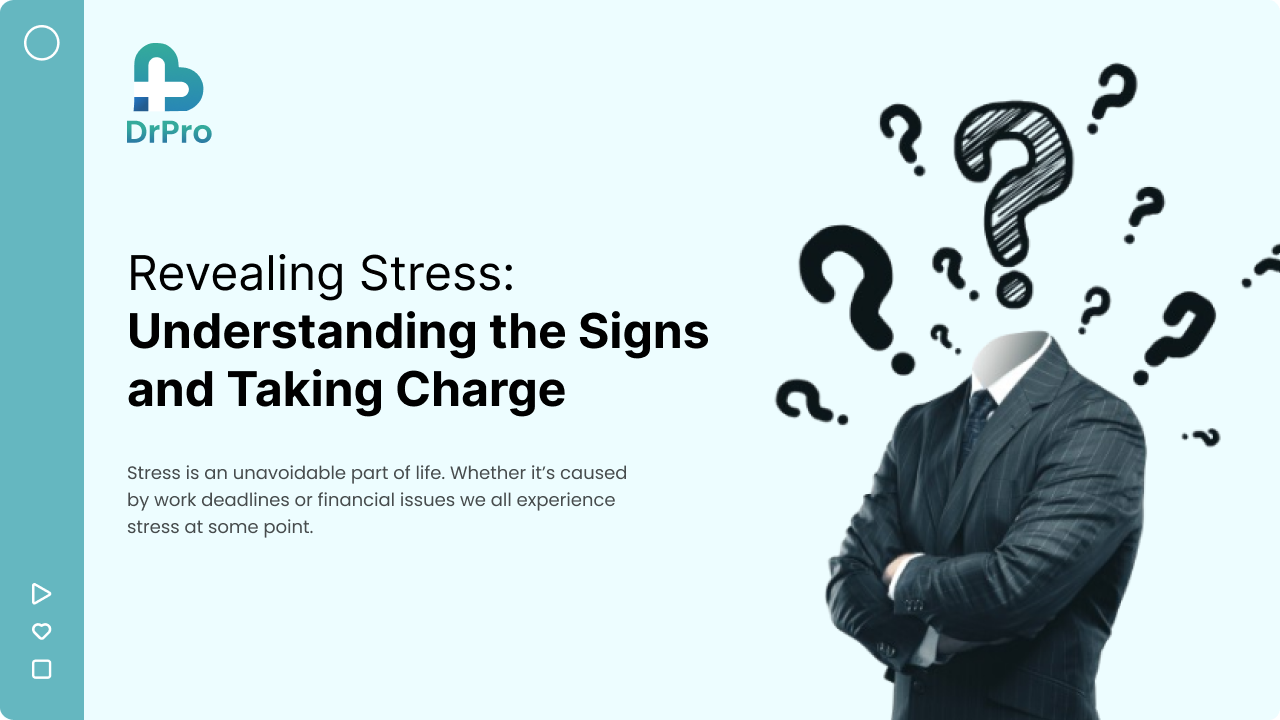Stress is a normal phenomenon in everyone’s life, and it has an impact on everybody. It could arise from work, interactions with family, friends, or partners, finances, or health issues, and recognize stress demonstrably affects the body and mind. This article thus serves to inform peers, friends, parents, colleagues, and everybody else of the indications of stress and how it ought to be dealt with so that one may be enabled to go back to being healthy. This blog will discuss physical, emotional, behavioral, and cognitive signs of DrPro Wellness recognize stress, as well as practical ways to treat it.
Spotting recognize stress: Recognizing the Signs and Symptoms
As we have seen, stress tends to make itself known gradually, by presenting itself in ways that can be very hard to identify. Knowing these symptoms ensures that people are aware when stress is affecting them and they should change it.
1. Physical Symptoms
Stress always manifests itself in some kind of physical symptom or altering of the body. These symptoms are the body’s way of signaling that something is off balance:
Tension or Pain: Some of the best-known signs include chronic headaches, and stiff neck or muscle tension in the back as well as shoulders.
Fatigue: One of the clear symptoms of stress is that you can wake up in the morning feeling exhausted even when you slept for several hours.
Rapid Heartbeat: Some patients may complain of palpitations or chest tightness, often during the most severe acute recognized stress episodes.
Digestive Issues: recognize stress causes one to lose appetite or have an irregular appetite leading to stomach aches or nausea.
Weakened Immune Response: A person is likely to have more than two colds, or infections, or take a long to recover when recognize stress is affecting their immune system.

2. Emotional Changes
Emotional well-being can be severely affected by stress, leading to noticeable changes in mood and feelings:
Irritability: He thus experiences more often the feeling of annoyance or anger, for flimsy reasons at that.
Anxiety or Restlessness: Something you may feel as a palpable lingering nervousness, anxiety, or restlessness.
Sadness or Hopelessness: The marketing concept that involves a sustained aversive mood or negative outlook on the future.
Overwhelm: Impaired capacity to perform or to master challenges in life.
3. Changes in Behavior
Behavioral patterns often shift under recognize stress, providing visible cues that something is wrong:
Social Withdrawal: Lack of interest in social interaction and hobbies or recreation previously found pleasant.
Changes in Eating Habits: Gaining or losing a large amount of weight in a short space of time.
Substance Dependence: Resorting to alcohol, smoking, or caffeine as our means of coping.
Procrastination: Inability to initiate or finish a task because of impaired attentiveness or motivation.

4. Sleep Disturbances
Stress disrupts the body’s ability to rest and recover, leading to sleep-related issues such as:
Insomnia: Difficulty with either the ability to sleep or to remain asleep when one’s body is physically tired.
Oversleeping: Sleeping is a way of avoiding or escaping something that causes stress.
Nightmares: In other words, recognize stress which remains unresolved manifests itself in frequent or unpleasant dreams.
5. Cognitive Symptoms
The mental effects of recognize stress can impair an individual’s ability to function effectively, manifesting in:
Poor Concentration: Lack of ability to concentrate and procrastination.
Forgetfulness: Forgetting to take something or other with you or forgetting something very important that was said in a conversation for instance.
Negative Thinking: Self-uncertainty and always thinking negatively about events.
Indecisiveness: Considered impaired decision-making or difficulty in making choices or judgments.

Taking Charge
The moment recognize stress is identified the process of handling it is crucial to achieve a natural healing and avoid subsequent stress and its unwished effects. Because stress is not always avoidable, one needs to have a way that will help minimize it and this can only be done through practicing or having support.
1. Identify Stressors
Before one can manage stress, he or she needs to know where it is coming from. Identifying triggers can help you develop a targeted approach to manage them:
- A stress diary can also be used to record all incidences or events that lead to stress.
- Consider how each of you deals with stress and think of behaviors that are not healthy.
- This is good advice but should be made clearer in terms of this list by grouping the stressors according to their nature – work-related, relationship-related, and financial stressors.
2. Practice Self-Care
Caring for yourself is one of the most effective ways to build resilience against stress:
- Exercise Regularly: This way, by engaging in any type of physical activity, the brain is eased and recognize stress is combated because endorphins are natural stress busters.
- Eat a Balanced Diet: It forms part of human resources and contributes to individuals’ health and efficiency.
- Stay Hydrated: Energy and willingness come with the body and the nutrient that is water.
- Sleep Well: Set and maintain a sleep schedule and enhance it with a favorable sleep hint.
3. Set Boundaries
Pressure is usually obtained when more is expected to be accomplished. Learning to set boundaries can reduce feelings of overwhelm:
- Saying ‘NO’ when calls are made beyond your capability level is important.
- Devote some of your time as a break or for any activity, that you find relaxing or enjoyable.
- It is very important to try to avoid exposing oneself to stressful situations or people where possible.

4. Seek Support
Sharing experiences with others can also bring some sort of comfort and fresh insight. Never hesitate to seek help when DrPro’s Clinic management system recognize stress becomes overwhelming:
- Friends and Family: Speaking to people that you know will understand exactly how you feel can be helpful.
- Support Groups: People with similar experiences may be encouraging as well to others out there.
- Professional Help: Coping strategies may be suggested to the patient by the therapist or counselor.
5. Mindfulness and Relaxation Techniques
Mindfulness practices can help anchor you in the present moment, reducing anxiety and promoting calmness:
- Deep Breathing: In other cases, try and take deep breaths regularly beginning at the lower part of the abdomen.
- Meditation: Prayer – as simple as taking 5 minutes of your time to sit inquiete time to promote concentration and relaxation.
- Progressive Muscle Relaxation: Subdivided and relax tight muscles in the body to reduce mechanical tension.
- Mindful Activities: Try to stay with it and get involved in terms of taking a walk or knitting to help in calming the brain.

Conclusion
Stress is a natural part of life, but its impact doesn’t have to be overwhelming. Recognizing the signs early and taking charge through practical strategies can significantly improve your quality of life. By identifying recognize stress, prioritizing self-care, setting boundaries, seeking support, and practicing mindfulness, you can regain control and build resilience for the future.
FAQs
Q1. What causes recognize stress, and is it always bad?
Stress is caused by various challenges or demands, such as work deadlines, financial issues, or personal conflicts. While chronic recognize stress is harmful, short-term stress can sometimes motivate action and problem-solving.
Q2. How do I know if my stress is too much?
If stress begins to affect your daily life, relationships, or health, it may be time to seek professional support or make lifestyle changes.
Q3. Can recognize stress lead to physical health problems?
Yes, prolonged stress can contribute to health issues like high blood pressure, heart disease, diabetes, and a weakened immune system.
Q4. How can I quickly reduce and recognize stress in the moment?
Deep breathing, taking a short walk, listening to calming music, or practicing mindfulness are effective ways to reduce stress quickly.
Q5. When should I consider therapy to recognize stress?
Therapy is recommended when stress becomes unmanageable, leads to severe anxiety or depression, or persists despite self-care efforts.

